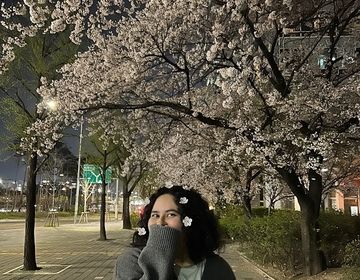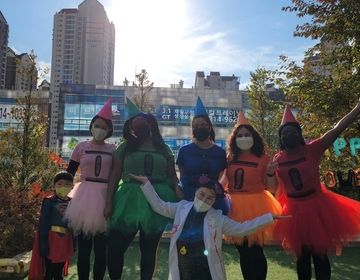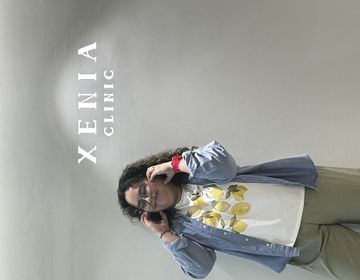Meeting my Co-teacher
above, below: watching a monk at a Korean temple in Jeonju during an EPIK excursion.
It was around nine thirty in the morning when I got on the bus with the rest of class 6. We were headed to Gumi, South Korea where each of us would meet our co-teachers. Gumi is a city with sprouting condominium complexes and high rise office buildings. It has an urban feel that pulsates along a row of mountains.
Tucked off a windy road on a mountain, our bus stopped at a touristy village in Gumi. Our POE supervisor stood up at the front of the bus. He said, “village, village…lunch.”
This was a lunch stop. It would be our last meal together, all of class 6. So we sat down for a traditional bibimbap lunch, crossed our legs, and enjoyed what time we had left to see each other, some of us for a long while.
Most of us were too nervous to go exploring after lunch. It was more convenient to sit and talk about where each of us might end up. So a few of us gathered in an upstairs coffee shop close to the parking lot and pulled up a map of the Gyeongsangbuk-do province on our smart phones.
EPIK’s orientation had stressed predominantly the importance of co-teachers. With that monumental consideration, all of us were constantly grooming ourselves. First impressions are everything. When we stepped back on the bus, I had a friend tighten my tie a little tighter because my hands weren’t working well with it.
On the way to—I’m still not sure where in Gumi we ended up—we stopped at a rest stop. This was no ordinary rest stop. In fact, to American rest stops, Korean rest stops really look like little tourist venues where you can relax and unwind.
However, I needed prodding to even get off the bus. I was set on meeting my co-teacher. There were only two people left on the bus once it emptied out: another teacher, Jordan, and myself. Twenty minutes or so after the bus had emptied out, we decided to release a little of our nervousness and anxiousness. We got off.
The rest stop was filled with people outside of our EPIK group. There were FREE message chairs, restaurants, gift shops and all of this overlooked a beautiful river which flowed gently behind the rest stop. I didn’t buy anything at the stop but it was nice to see a rest stop with an atmosphere far different from an American one.
We stayed at the rest stop for about an hour. Our next hour or so spent on the bus was seething with anxiousness. It was clear that everyone was thinking similarly. EPIK told us several times that your co-teacher becomes a sort of lifeline for your Korean life. In any job it is up to the individual to make the most of his or her situation. But in Korea they said, your co-teachers are the biggest factor second to yourself, for your success.
As the time passed, it got quieter. There was chattering here and there, but most of the teachers including myself had there eyes set on the windows. It was getting close to that moment. I kept wondering when the bus would stop, and where.
Our bus turned at the blink of an eye. It parked at what looked like another tourist village, in a gigantic but empty parking lot. Our POE supervisor stood up and said something none of us quite understood. But he got off the bus before we could ask any questions. Those of us in the back of the bus took that as a “this was it” remark because everyone in the front stood up and left the bus to grab their belongings.
Once I stepped down from the bus I got my luggage together and stood with the throng of teachers. On the other side of the parking lot, cars began to pull in. Black cars, white cars parked next to one another. There were no other colors and the only car models were Korean-made Hyundai and Kia. Out of each car stepped a Korean co-teacher. Some were dressed in casual clothes, some were dressed in business casual, some in dress attire. All of them carried signs which they held up high. The signs had a foreign English teacher’s name written on them.
I started hearing other teachers call each other’s names. The co-teachers looked just as anxious as us. They walked towards us, some into our crowd, holding up their signs, but silent. I looked at each side of the parking lot, each end of co-teachers. I didn’t see my name.
Soon my EPIK colleagues were off with their co-teachers to their new destinations. As the co-teachers’ crowd began to dissipate, I became worried. I squinted earnestly. Then a slim Korean lady wearing a t-shirt and a blue skirt approached me. In her arms was a sign no bigger than a sheet of printer paper with my name on it. I looked at her, and rushed a formal Korean greeting. She extended her hand for a shake. I awkwardly half bowed, half shook her hand.
When we got in the car, I would not stop smiling. But this was short-lived because I was sweating like I had just gotten off a treadmill. She turned the car on and said: “My name is Hye-Jeong (Hee-Jung)”. Before we left the parking lot, she asked me if I wanted to buy a phone today, and anything else. We discussed where I could buy a phone but my main question was if my apartment had internet.
She wasn’t sure.
There was another person in the English department I would also meet that day, who was preparing my apartment, but that would not be until much later. Hye Jeong told me she had just left Daegu on her way to pick me up, which was about an hour away. But Yeongyang is far, she said. She laughed. Yeongyang is very far. Along the way she asked me about my family, my university, my major and about my hobbies. She had heard that I was an English major. When I told her wrote poetry and had a poem published she gasped. She said she was a writer, too. The more she drove, the more we talked. The more she drove, the steeper the land became along the sides of the highway.
The highway thinned into a windy road where the mountain trees collided with each bend in the road. The road reminded me of the Blue Ridge Parkway; although this road was at a lower altitude than any blue ridge highway. Farms began to appear, scattered and inconsistent but beneath us in small valleys. Along the cliffs of mountains, there were tiny orchards and small red pepper gardens bearing fruit and vegetables on steep edges. What I had read about Yeongyang was true, the farmland here is scarce. But it really is hard to believe until you see it for yourself. I had read that only ten percent of the land in Yeongyang is cultivable. Indeed, they use all the space they can.
We made it to my apartment around five pm that evening.
I made it!!!!!
Yours truly,
Evan
Related Posts
A Comprehensive Budgeting Guide for English Teachers in South Korea
A Comprehensive Budgeting Guide for English Teachers in South Korea Teaching English in South Korea has become an increasingly popular option for young people looking to travel and get some... keep reading
Professionalism in South Korea as a Native English Teacher
As a native English teacher in South Korea, understanding Korean culture and professionalism is crucial for both personal success and the broader impact you can have on your students. South... keep reading
How to Go to the Doctor in South Korea as an English Teacher: A Guide to Healthcare and Health Insurance
As an English teacher in South Korea, maintaining good health is essential while living abroad. Navigating the healthcare system can seem daunting and stressful at first, especially if you can’t... keep reading


